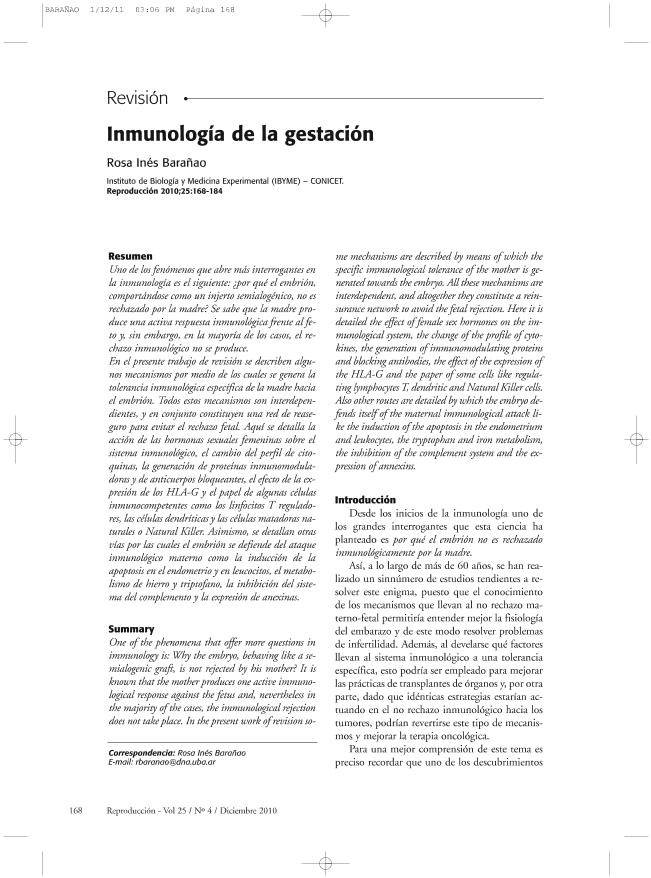Artículo
Uno de los fenómenos que abre más interrogantes en la inmunología es el siguiente: ¿por qué el embrión, comportándose como un injerto semialogénico, no es rechazado por la madre? Se sabe que la madre produce una activa respuesta inmunológica frente al feto y, sin embargo, en la mayoría de los casos, el rechazo inmunológico no se produce. En el presente trabajo de revisión se describen algunos mecanismos por medio de los cuales se genera la tolerancia inmunológica específica de la madre hacia el embrión. Todos estos mecanismos son interdependientes, y en conjunto constituyen una red de reaseguro para evitar el rechazo fetal. Aquí se detalla la acción de las hormonas sexuales femeninas sobre el sistema inmunológico, el cambio del perfil de citoquinas, la generación de proteínas inmunomoduladoras y de anticuerpos bloqueantes, el efecto de la expresión de los HLA-G y el papel de algunas células inmunocompetentes como los linfocitos T reguladores, las células dendríticas y las células matadoras naturales o Natural Killer. Asimismo, se detallan otras vías por las cuales el embrión se defiende del ataque inmunológico materno como la inducción de la apoptosis en el endometrio y en leucocitos, el metabolismo de hierro y triptofano, la inhibición del sistema del complemento y la expresión de anexinas. One of the phenomena that offer more questions in immunology is: Why the embryo, behaving like a semialogenic graft, is not rejected by his mother? It is known that the mother produces one active immunological response against the fetus and, nevertheless in the majority of the cases, the immunological rejection does not take place. In the present work of revision some mechanisms are described by means of which the specific immunological tolerance of the mother is generated towards the embryo. All these mechanisms are interdependent, and altogether they constitute a reinsurance network to avoid the fetal rejection. Here it is detailed the effect of female sex hormones on the immunological system, the change of the profile of cytokines, the generation of immunomodulating proteins and blocking antibodies, the effect of the expression of the HLA-G and the paper of some cells like regulating lymphocytes T, dendritic and Natural Killer cells. Also other routes are detailed by which the embryo defends itself of the maternal immunological attack like the induction of the apoptosis in the endometrium and leukocytes, the tryptophan and iron metabolism, the inhibition of the complement system and the expression of annexins.
Inmunología de la gestación
Fecha de publicación:
12/2010
Editorial:
Sociedad Argentina de Esterilidad y Fertilidad
Revista:
Reproducción
ISSN:
0327-9294
Idioma:
Español
Tipo de recurso:
Artículo publicado
Clasificación temática:
Resumen
Palabras clave:
Embarazo
,
Tolerancia
,
Citoquinas
,
Leucocitos
Archivos asociados
Licencia
Identificadores
Colecciones
Articulos(IBYME)
Articulos de INST.DE BIOLOGIA Y MEDICINA EXPERIMENTAL (I)
Articulos de INST.DE BIOLOGIA Y MEDICINA EXPERIMENTAL (I)
Citación
Barañao, Rosa Ines; Inmunología de la gestación; Sociedad Argentina de Esterilidad y Fertilidad; Reproducción; 25; 4; 12-2010; 168-184
Compartir




